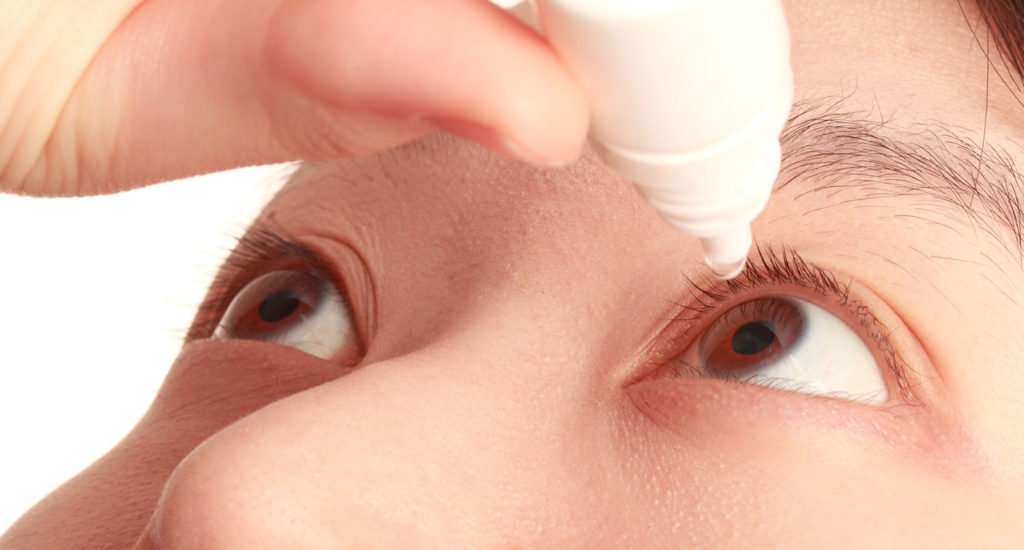Using Eye Drops After Their Expiration Date
Published by on April 9, 2019
Picture this: Your eyes are uncomfortably dry. In fact, you may have been wondering, “Do I have chronic dry eye?” You dig through your medicine cabinet, searching for that half-empty bottle of eye drops that you swore you had. Good news – you find it! As you twist off the lid, you notice the minuscule text on the back of the container that reads, “EXP: MAR 2013.” Six years expired. A few drops won’t hurt, right? Not so fast!
The Risk of Using Expired Eye Drops
Expiration dates are not suggestions when it comes to medications, or in this case, eye drops. Using drops past their listed expiration date can lead to irritation, inflammation, and even an eye infection. The chemical compound of eye drops may change and lose potency over time. It is important to discard drops at the proper date to ensure no further usage and keep your eyes safe.
Bringing an old, used dropper near your eyes is also a risk factor for transferring unwanted germs to your eyes and allowing them to spread. This can lead to further irritation and a much higher chance for infections. The risk that comes along with using expired eye drops is not worth the health of your eyes.

When Over-the-Counter Eye Drops Aren’t Enough
For some, even an almost constant supply of drops or lubricants provides only the most fleeting relief. If this is the case for you, and you notice an increase in eye dryness and discomfort with seasonal changes, after prolonged contact lens wear, or computer use, you would be wise to be evaluated for dry eye syndrome. Dry eye syndrome is an ocular surface disease characterized by intense dryness, a scratchy feeling in the eyes, or a sensation of a foreign body in the eye.
The Causes of Dry Eye Syndrome
While all dry eye syndrome is irritating, not all cases are alike. There are actually two types of dry eye syndrome: aqueous deficient dry eye and evaporative dry eye. Aqueous deficient dry eye is caused by the eyes not producing enough tears to lubricate the eye. Evaporative dry eye occurs when tears evaporate too quickly off the eye’s surface.
Evaporative dry eye is the most common form of dry eye syndrome, accounting for roughly eight out of 10 of dry eye diagnoses. The tears evaporate too quickly because they do not contain enough of the natural oils secreted by the meibomian glands – small glands within the eyelid. The lack of these natural oils, called lipids, leads to the liquid tears not sticking to the surface long enough to keep the eye hydrated and comfortable. This lack of tear oil is often referred to as meibomian gland dysfunction (MGD).

I Think I Have Dry Eye. What’s Next?
If you think you may have dry eye syndrome, and no amount of over-the-counter drops is providing comfort, it’s time to seek help from the dry eye experts at Kugler Vision in Omaha, Nebraska. Here, we specialize in all the latest dry eye evaluation and treatment options, including LipiFlow treatment for meibomian gland dysfunction and BlephEx treatment for blepharitis and dry eye. We also carry products that have been found to provide comfort for dry eye, including moist heat therapy masks, special PRN omega-3 supplements to boost lipid production, and drops designed to help hydrate dry, uncomfortable eyes.
If you’re currently wearing contact lenses and experiencing dry eye, you may be suffering additionally from contact lens intolerance (CLI) – a common and often undiagnosed issue that can progress over time, making it nearly impossible to wear contacts for any extended period without eye discomfort. If you think you may have CLI, booking an evaluation is the best place to start so that you can find a vision solution to get rid of those irritating contact lenses.
Do you find yourself reaching for the eye drops more frequently? The abundant need for eye drops or artificial tears can be a sign that you may be suffering from Dry Eye Syndrome, take the self test by clicking the button below now to assess if this may be you.


What Other Conditions May Lead to Increased Reliance on Eye Drops?
Another common condition often associated with dry, scratchy feeling, uncomfortable or painful eyes is Contact Lens Intolerance (CLI). Contact Lens Intolerance describes the process in which the body begins to reject the presence of the foreign body – contact lenses – in the eye. Contact Lens Intolerance is a progressive condition that generally gets worse with time the longer the individual relies on extended contact lens use. The average age of Contact Lens Intolerance is about 35, though this painful condition can develop more quickly or slowly for some. Factors like contact lens hygiene, amount of years using contact lenses, and duration of contact lens wear on average can all impact the severity and speed with which CLI develops.
What Are the Symptoms of Contact Lens Intolerance?
The level of discomfort people with Contact Lens Intolerance experience can range from mild to severe. The most common symptoms of CLI are:
- Dryness, itchiness, or scratchy sensation in the eyes
- Eye redness
- Irritation
- Eye Inflammation
- Pain, stinging, or other discomfort while applying contact lenses
- Abrasions of the cornea
- Corneal Ulcers
- Rationing contact lens time
- Resorting to wearing glasses to avoid contact lens associated pain
I Think I Have Contact Lens Intolerance. What Do I Do?
Because many of the symptoms of CLI- like dryness, scratchy sensation, and irritation, can mimic those of Dry Eye people can often be confused as to which condition they have. Vision experts like the team at Kugler Vision can help determine which, if any, eye condition you may be experiencing and help you to navigate treatment options. If you suspect you may have CLI and are in the Omaha, Nebraska area– please call our team at 402-558-2211 or contact us via our site to schedule an appointment to be evaluated.
Or, you can take our simple Contact Lens Intolerance self test at the button below to begin your CLI research and quickly assess the chances that you are experiencing CLI.
Keeping Your Eyes Healthy. Please Don’t Use Expired Eye Drops.
Before you put those drops in, always check the expiration date. An expired bottle of drops will likely not give you the relief you’re seeking, but an increased infection risk instead.
If your current drops just aren’t doing the job, give the Kugler Vision experts a call at 402-558-2211 or book a consultation online. We’re here to help.

Lance Kugler, MD, is a specialist in LASIK and vision correction surgery and CEO of Kugler Vision. A proud Omaha native, he is passionate about improving lives through clear vision. Dr. Kugler serves on several national boards, and his practice is recognized internationally as a center of excellence. Dr. Kugler is one of the original founders of the Refractive Surgery Alliance, an international organization comprised of over 350 of the world’s leading vision correction surgeons; he also served as its first president. In 2019, Dr. Kugler was selected as a TEDx speaker, and delivered a talk in Omaha about the worldwide epidemic of nearsightedness and refractive solutions. Dr. Kugler is an Associate Professor of Refractive Surgery at the University of Nebraska Medical Center’s Truhlsen Eye Institute, has been published in many medical journals, and participates in numerous clinical studies to advance the field of vision correction surgery. Additionally, Dr. Kugler is proud to be a Board Certified Fellow of the World College of Refractive Surgery & Visual Sciences. Dr. Kugler and his wife are proud parents to five active kids. When he has a spare moment, he enjoys skiing, tennis, travel, and fine coffee.

I have 2 bottles of Bausch +Lomb Maximum Redness eye relief, it’s expiration date was 07/2018, should I throw away?
Hi Bobbie–
Thanks for reading! It is not recommended to use drops past their expiration date– I’d recommend throwing out those two bottles that expired 7/18 and getting new ones.
i accidentally used the wrong eye drops which expired last year, i washed my eye out with lots of cold water, will that help?
Hello–
Unfortunately, we cannot advise on this over the web. I recommend calling your eye doctor if you have any concerns on these eyedrops. Thank you for reading.
I have unopened eye drop of
LATANOPROST0.005% dated 12-28-18
can I use the drops?
Thank You
Hello Peggy. We recommend that you contact the doctor that originally prescribed the Latanoprosto eyedrops to you to see what they would like you to do with the drops. We are unable to give medical advice online. Thank you for being a reader!
I have a bottle of lotemax unopened from expiration 12/17 …they are expensive …can I still use these?
Hello LuAnn–
Unfortunately, we cannot advise on this over the web. I recommend calling your eye doctor if you have any concerns on these eyedrops. Thank you for reading.
Hello. I accidentally used eye drops that expired in May 2020. Will I be okay? I didn’t notice the expiration date until after I put them on.
Hello–
Unfortunately, we cannot advise on this over the web. I recommend calling your eye doctor if you have any concerns on these eyedrops. Thank you for reading.
Hello, I put tears naturale in my eye yesterday. It has been expired for over a year. Will it cause permanent damage of any kind? Thanks in advance
Hello–
Unfortunately, we cannot advise on this over the web. I recommend calling your eye doctor if you have any concerns on these eyedrops. Thank you for reading.
I have travatan z expired 3/20 is it still good.
Hello–
Unfortunately, we cannot advise on this over the web. I recommend calling your eye doctor if you have any concerns on these eyedrops. Thank you for reading.
Hi
From which Part of ICH can I find the protocol for expiration of eye drops after opening?
Thanks regard
Hello Ali. Thank you for reading. We don’t know which part of ICL has the protocol you’re requesting, but suggest you contact the doctor who prescribed the drops. Thank you.